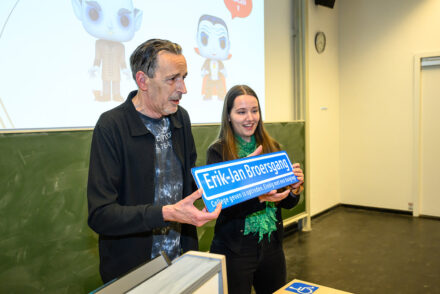Women’s voices still go unheard on campus
Popular belief has it that women talk a lot. But in the academic world, it’s men who do most of the talking. Tilburg University is no exception, academics say. “Our campus remains a bastion of white male privilege.”
It’s no secret that women are invited to give talks at universities and scientific conferences less often than men. Research has confirmed it many times over. There’s even a Tumblr site, ‘Congrats, you have an all-male panel!’, which documents examples of all-male speaker line-ups at conferences across the world.
The lack of female voices is an issue at Tilburg University as well. Although no one keeps track officially, it doesn’t take a lot of effort to see that female speakers are vastly outnumbered by men at discussion events, symposia and public lectures on campus. At recent editions of regular events and lecture series such as ‘Food for Thought’, ‘Introducing the Netherlands’, ‘Hartslagcafé’, ‘Last Lecture’, ‘Science Cafe’ and the university’s annual Dies Natalis, the experts brought to the stage were mostly men.
Harder to find
Why do female academics give fewer talks than men? One commonly-heard explanation is that female speakers are harder to find, since men outnumber women in higher academic positions. Another is that women say no to speaking invitations more often than men.
At Tilburg University, Academic Forum is the main platform for bringing research and ideas to a broader audience through discussion events and public lectures. “It’s true that the pool of available women speakers is smaller than the pool of available men,” says Academic Forum programmer Annelieke Koster. “You’re also less likely to find non-white speakers. The academic community as a whole is predominantly white, and academics in higher ranking positions are predominantly male.”
Women don’t turn down more invitations than men, Koster says. “In my experience, that’s not an issue. Women do tend to ask for more information before agreeing to speak. In that sense you could say that perhaps women are less quick to say yes than men, but I wouldn’t say they’re quicker to say no.”
Gender policies
Koster believes it’s important to have a diverse set of speakers weighing in on public discussions on campus. “We do try to pay attention to diversity,” she says. “Academics are role models. It’s important for students and other Tilburgers to see that everyone can be an academic, not just white middle-aged men dressed in gray suits.”
“It’s important for people to see that everyone can be an academic, not just white middle-aged men dressed in gray suits”
Nevertheless, diversity is not a primary concern for Academic Forum. “For us, getting the best speaker on a specific topic is what’s most important. That’s what we focus on,” Koster says. “We don’t work with quotas or targets.”
The same is true for Univers, which, as the university newspaper, also serves as a platform for different voices and ideas on campus. When searching for academics with an expertise in a certain field for comments and interviews, there are no official policies to ensure that female voices are heard.
Chewing gum
The question is: should there be? Koster doesn’t believe so. A lot is being done already to improve gender equality in academia, she says, making official policies to regulate the number of female speakers unneeded. “We should definitely stay alert to a lack of diversity when looking for speakers, but I don’t think we need official policies. As the pool of female academics continues to grow, I’m optimistic that the pool of women speakers will grow along.”
Not everyone shares Koster’s optimism. According to Alkeline van Lenning, educational professor at the Humanities faculty and dean of University College Tilburg, the lack of female voices is not a problem that will sort itself. “A lot of people underestimate the complexity of the problem. It’s an extremely layered and pervasive problem. It’s like having chewing gum stuck in your hair. There’s no easy way to fix it, but doing nothing definitely won’t make it go away.”
Not about numbers
If we want to get the gum out, Van Lenning stresses, the focus shouldn’t just be on improving numbers and percentages. Simply counting up the number of women on a discussion panel to make sure women are represented is not enough. “It’s not just about the number of women you invite to speak,” Van Lenning says. “It’s about the academic positions these women hold, it’s about the type of questions they are asked, it’s about the speaking time they get, it’s about the frequency and nature of the interruptions they receive.”
Morag Goodwin, professor of Global Law and Development, agrees. “The problem is definitely more complex than numbers,” she says. “Numbers are one thing, but then the question is: who speaks when about what? Is the female perspective genuinely represented?”
Recently, Van Lenning was invited to lead a panel discussion at the Erasmus Festival Brabant in Den Bosch. On the panel were the male rectors of three universities, including rector Emile Aarts of Tilburg University, and three female students. Although the panel consisted of an equal number of men and women, Van Lenning says it was far from an equal discussion. “Yes, we had three women and three men on the panel—but the men were all older, white, and in powerful positions. Although they absolutely didn’t intend to do so, they completely overshadowed the women.”
[caption id=”attachment_115498″ align=”aligncenter” width=”100%”> Illustration: Martien Bos
Gender bias
Diversity and inclusion programs generally focus on improving the number of women in academia. For example, the most important program at Tilburg University—the Philip Eijlander diversity program—aims to tackle the lack of women in higher academic positions. But the lack of female voices in public discussions on campus proves to be a more difficult problem to tackle. “Hearing different voices and ideas is extremely valuable. It allows for different perspectives to come into our research and to come into our education. We miss that on campus,” Goodwin says. “The university remains a bastion of white male privilege.”
Fixing the gender gap in public speakers will not automatically fix a much deeper-running problem: gender bias. “We grew up with ideas about when women should speak and about what,” Goodwin says. “We are all caught up in that system. Not just men, women too—women can be equally biased against women as men are. It’s about becoming aware of this.”
“Women can be equally biased against women as men are”
A good speaker
Nuna Zekic, assistant professor at Tilburg Law School, says platforms such as Academic Forum and Univers should also consider what gender biases they may harbor. “If your task is to structurally provide a platform for different voices on campus, you have a responsibility to at least become aware of the unconscious mechanisms that tend to favor men over women.”
Zekic fully understands that the university looks for good speakers for its events. “But then the question is: what makes you think of someone as a good speaker? The qualities you appreciate in a speaker, such as confidence and assertiveness, might themselves be driven by gender bias. We are socialized, consciously or not, by the male examples of ‘good’ public speakers that we were brought up with.”
Biased students
The silent force of gender bias is present in the classroom, too. A burst of new research on student evaluations has shown that students, both male and female, perceive female lecturers as less competent than male lecturers.
When these studies on students’ biases against female lecturers came out, Goodwin asked her own students what they think makes a good lecturer. “A good lecturer is someone who speaks authoritatively, they said. Apparently you’re not judged by how much you know or how well you communicate that knowledge, but by how authoritative you are,” she says. “Similarly, when Academic Forum looks for a keynote speaker, they may want someone who is a bit of a showman, a performer, someone who can hold the stage. You’re probably more likely to get a man who fits that image.”
Male standards
In order to get ahead, Goodwin says, women scientists have to conform to male standards. “You have to manifest yourself in a certain way,” she explains. “It’s important that women are heard, but it’s equally important that they are listened to on their own terms.”
Nuna Zekic says the differences between men and women don’t point to differences in their academic competence. “In my experience, male academics engage in self-promotion a lot more keenly than women. They tend to seek publicity and attention more actively than women. But that doesn’t mean that women are insecure or incompetent. The women I work with certainly aren’t.”
Imitation
At times, Zekic sees female colleagues mimic the ‘alpha male’ behavior that seems to work well for male academics. “Personally, I don’t think the public debate benefits if all women start doing that. It shouldn’t be about who speaks loudest, it should be about interesting ideas and good academic work. And in that respect, men certainly don’t outperform women.”
According to Van Lenning, it’s not too surprising that women tend to imitate the assertive, self-promotional tactics they see successful male academics use to get their voices heard. The academic world has long been an all-men’s playing field, she explains, and women have only just started to participate and compete within that system. “Imagine you’re invited to a fancy dinner with state leaders. How would you behave? You would watch how everybody else behaves, and you would do as they do. You’re not going to stand up and shout, ‘Hey, here’s what I think!’, because that will only open the door for those fancy people to point to the reasons why you were excluded in the first place.”
Natural
The fact that women have a seat at the table doesn’t mean equality has been achieved, Van Lenning says. Countering the underrepresentation of women at scientific events requires more than putting an equal number of men and women on the invite list. The problem, as Van Lenning, Goodwin and Zekic all point out, is much more complex.
What can be done, then? The academics agree that raising awareness on implicit gender bias is key. “Most men are not aware of their privilege, because it seems natural to them,” Goodwin says. “That’s why it’s so important that we see women speak from a position of power, from as early an age as possible. It changes what men think is normal and natural, and it changes what women think is possible.”
Everyone’s issue
Van Lenning stresses that pointing fingers will not solve the problem. “People sometimes blame women for not trying hard enough, or for not speaking up enough. I don’t think that’s very productive,” she says. “And it’s equally unproductive to blame men for silencing women. It’s everyone’s issue—we’re all affected by it and we’re all complicit in it. We are all tangled up in that chewing gum that is stuck in our hair.”
Goodwin is on the board of the recently launched Tilburg University Network for Women, which aims to promote the representation of women on campus. The first meeting of the women’s network will take place on the 26th of June. “There’s no agenda, we just sit and talk and get to know each other. It’s this sort of networking that women don’t participate in often,” Goodwin says. Men are welcome to join the women’s network as well. “We would absolutely welcome men to participate.”
Although Goodwin believes active intervention is still needed to help women’s voices get heard, some important steps forward have been made. “Things are better than when I started twenty years ago. There are more women around today, and men are more aware of the disparities between male and female academics,” she says. “Everyone agrees that diversity and hearing different voices is important. That’s quite something. Now we just have to work out what we are going to do with that agreement.”







